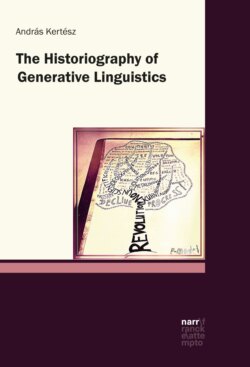Читать книгу The Historiography of Generative Linguistics - András Kertész - Страница 25
На сайте Литреса книга снята с продажи.
2.2.2 No revolution 2.2.2.1 Ideology
ОглавлениеThe following approach illustrates that it is possible to evaluate the role of AspectsAspects from another perspective than that of the KuhnianKuhnian revolutionrevolutionKuhnian. As is well known, the generative semanticssemanticsgenerative movement was closely related to the circumstance that the role of deep structure, which was introduced in Aspects, was evaluated in two different ways. According to generative semanticists, the generative component of grammargrammar is semantics and the strict division between syntax and semantics collapses. In contrast, the Chomskyan approach maintains that the semantic component is »purely interpretive« (see Section 2.2.0). As the rise of the generative semantics movement initiated by James D. McCawleyMcCawley, James D., George LakoffLakoff, George, Paul PostalPostal, Paul M. and John Robert RossRoss, John R. is closely related to the appearance of Aspects, we now briefly discuss the conflict between this movement and Chomskyan interpretive semanticssemanticsinterpretive. The evaluation of the conflict between them is similar in HarrisHarris, Randy Allen (1993a, b, c), HuckHuck, Geoffrey J. & GoldsmithGoldsmith, John A. (1995), MurrayMurray, Stephen O. (1994), SeurenSeuren, Pieter A.M. (1996), and Seuren (1998); we exemplify this conception by Huck & Goldsmith (1995).
The ›official‹ chronicle generally accepted as a result of NewmeyerNewmeyer, Frederick J.’s (1980, 1986a) works – which was also propagated in widely used textbooks such as RiemsdijkRiemsdijk, Henk and WilliamsWilliams, Edwin (1986) – represents the process leading from the appearance of Syntactic StructuresSyntactic Structures to later developments as a continuous and linear progressprogress. According to this view, generative semanticssemanticsgenerative is seen as a regressive episode which justly lost the battle against the more progressive interpretive semanticssemanticsinterpretive, because it was both theoretically and empirically inferior to the latter.
HuckHuck, Geoffrey J. & GoldsmithGoldsmith, John A. (1995) – just like HarrisHarris, Randy Allen, MurrayMurray, Stephen O. and SeurenSeuren, Pieter A.M. – reject this ›received view‹. They ask the following question: If – according to the received view – the generative semanticssemanticsgenerative movement fell apart because its tenets were refuted by the proponents of Chomskyan interpretive semanticssemanticsinterpretive, then how could it happen that the very same tenets were integrated into the later development of generative linguistics? They answer this question in the following way (Huck & Goldsmith 1995: 92–93):
| (T13) | The received view according to which Chomsky’Chomsky, Noams interpretive semanticssemanticsinterpretive refuted the tenets of generative semanticssemanticsgenerative is »essentially ideologicalideology in character and scientifically unjustifiable.« |
As their historiographicalhistoriography framework, the authors choose LakatosLakatos, Imre (1970b). They believe that within the framework of Lakatosian ›scientificscientific research programresearchprograms‹ it is not possible to identify clear empirical grounds in the arguments put forward in the debate on which a decision between the two approaches could be based.1 Consequently, there is no empirical, theoretical and conceptual – i.e., scientific – reason for the victory of interpretive semanticssemanticsinterpretive over generative semanticssemanticsgenerative (HuckHuck, Geoffrey J. & GoldsmithGoldsmith, John A. 1995: 6–7, 91–95). Namely, the arguments put forward against the claims of generative semanticists were not strong enough to refute them; what is more, the tenets of the two approaches are compatible. Huck and Goldsmith devote special attention to argumentation, because they »understand that scholarly argument forms a crucial part of scientific life« (Huck & Goldsmith 1995: viii). That is, the downfall of generative semantics cannot be explained by its theoretical and empirical deficiency. Rather, it has to do with other – ideologicalideology, argumentative and rhetoricalrhetoric – factors. Thus, the victory of AspectsAspects over generative semantics must not be seen as the result of a linear and progressive process.
In summary:
| (SP13) | The basic terms of the historiographyhistoriography of generative linguistics are ›ideology‹ideology, ›rhetoric‹rhetoric and ›argumentation‹, which capture the relationship between interpretive semanticssemanticsinterpretive as discussed in AspectsAspects and generative semantics;semanticsgenerative its central hypothesis is (T13) and its framework is LakatosLakatos, Imre (1970b). |
